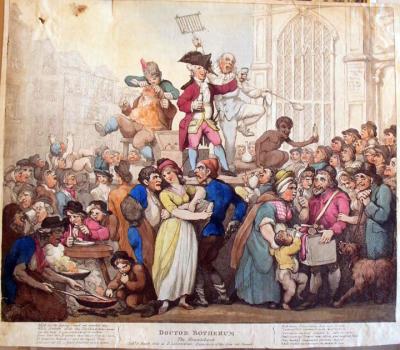
Word of the Day: Mountebank
Today’s word of the day, courtesy of Words Coach (https://www.wordscoach.com/dictionary), is mountebank. In his famous dictionary first published in 1755, Samuel Johnson says that a mountebank is “A doctor that mounts a bench in the market, and boasts his infallible remedies and cures” or “Any boastful and false pretender” (https://johnsonsdictionaryonline.com/views/search.php?term=mountebank). Merriam-Webster defines mountebank as “a person who sells quack medicines from a platform” or “a boastful unscrupulous pretender” (https://www.merriam-webster.com/dictionary/mountebank). M-W also provides definitions for mountebank as both a transitive (“to beguile or transform by trickery”) and an intransitive (“to play the mountebank”) verb, but both verb forms are listed as “obsolete” (ibid.).
M-W explains the etymology: “Mountebank derives from the Italian montimbanco, which was formed by combining the verb ‘montare’ (‘to mount’), the preposition ‘in’ (converted to im meaning ‘in’ or ‘on’), and the noun ‘banco’ (‘bench’). Put these components together and you can deduce the literal origins of ‘mountebank’ as someone mounted on a bench – the ‘bench’ being the platform on which charlatans from the 16th and 17th centuries would stand to sell their phony medicines. Mountebanks often included various forms of light entertainment on stage in order to attract customers. Later, extended uses of ‘mountebank’ referred to someone who falsely claims to have knowledge about a particular subject or a person who simply pretends to be something he or she is not in order to gain attention” (ibid.).
Etymonline.com says that the word entered the English language in the “1570s, from Italian montambanco, contraction of monta in banco ‘quack, juggler,’ literally ‘mount on bench’ (to be seen by crowd), from monta, imperative of montare ‘to mount’ (see mount (v.)) + banco, variant of banca ‘bench,’ from a Germanic source (see bench (n.)). Figurative and extended senses, in reference to any impudent pretender or charlatan, are from 1580s” (https://www.etymonline.com/word/mountebank). The origin of banco then is “from Proto-Germanic *bankon (source also of Old Frisian bank ‘bench,’ Old Norse bekkr, Danish bænk, Middle Dutch banc, Old High German banch). The group is cognate with bank (n.2) ‘natural earthen incline beside a body of water,’ and perhaps the original notion is ‘man-made earthwork used as a seat’” (ibid.). When I was a small child, if I stuck out my lower lip as a pout, my father, who spoke some German, would call it my Schusterbank (“cobbler’s bench”).
And so the word was available to Shakespeare, who used it several times, such as in Hamlet 4.7:
I bought an unction of a mountebank
So mortal, that but dip a knife in it,
Where it draws blood, no cataplasm so rare,
Can save the thing from death
That is but scratch’d withal
On this day 265 years ago, New York City became the first jurisdiction to mandate the “examining and licensing of prospective doctors, and penalizing unlicensed physicians” (http://www.famousdaily.com/history/ny-law-first-regulates-medicine-practice.html). Famous Daily writes, “Unscrupulous purveyors of fake medicine would take to the streets in middle-ages Netherlands, shouting to advertise their wares. They were called quacksalver, or kwakzalver in modern Dutch, leading to the term used for fraudulent doctors today—quacks. Quackery persisted through the centuries in Europe and found its way to the American colonies, where the earliest steps to regulate the profession were taken” (ibid.).
Etymonline.com says of quack (No. 2), “’medical charlatan, impudent and fraudulent pretender to medical skill,’ 1630s, short for quacksalver (1570s), from obsolete Dutch quacksalver (modern kwakzalver), literally ‘hawker of salve,’ from Middle Dutch quacken ‘to brag, boast,’ literally ‘to croak’ + salf ‘salve,’ salven ‘to rub with ointment’. As an adjective from 1650s.
“The oldest attested form of this quack in English is as a verb, ‘to play the quack’ (1620s). The Dutch word also is the source of German Quacksalber, Danish kvaksalver, Swedish kvacksalvare” (https://www.etymonline.com/search?q=quack).
So without laws requiring doctors to get licensed after extensive education, our country might be overrun with people standing on benches croaking about their salves. Whew.
Today’s image is from “Thomas Rowlandson (1756-1827), Doctor Botherum, the Mountebank, 1800. Etching with hand coloring” (https://www.princeton.edu/~graphicarts/2009/11/doctor_botherum_the_mountebank.html). I love the doctor’s last name although I would associate it more with lawyers than with doctors. Then again, I live in the 21st century, not the 18th or 19th century.